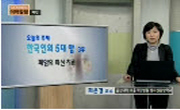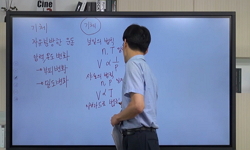Introduction: Although ambient air pollution has been associated with lung cancer incidence, little is known about the effects on a lung cancer survival. This study aims to investigate the effect of air pollution on the survival of lung cancer patient...
http://chineseinput.net/에서 pinyin(병음)방식으로 중국어를 변환할 수 있습니다.
변환된 중국어를 복사하여 사용하시면 됩니다.
- 中文 을 입력하시려면 zhongwen을 입력하시고 space를누르시면됩니다.
- 北京 을 입력하시려면 beijing을 입력하시고 space를 누르시면 됩니다.
Effect of air pollution on lung cancer survival : a nationwide cohort study = Effect of air pollution on lung cancer survival : a nationwide cohort study
한글로보기https://www.riss.kr/link?id=A105774404
- 저자
- 발행기관
- 학술지명
- 권호사항
-
발행연도
2018
-
작성언어
-
-
주제어
폐암 ; 대기오염 ; 생존률 ; Lung neoplasm ; Air Pollution ; Survival
-
자료형태
학술저널
-
수록면
176-176(1쪽)
- 제공처
-
0
상세조회 -
0
다운로드
부가정보
다국어 초록 (Multilingual Abstract)
Methods: We conducted a retrospective cohort study using nationwide lung cancer cohort. The daily levels of particulate matter with diameter ≤10 ㎍ (PM10), PM with diameter ≤2.5 ㎍ (PM2.5), nitrogen dioxide (NO2), sulfur dioxide (SO2), carbon monoxide (CO) and ozone (O3) were obtained from the Korean Ministry of Environment. A Cox proportional hazard model was used to estimate the risk that associated between air pollutant exposure and lung cancer survival.
Results: We analyzed 69,744 cases of lung cancer from Jan 2002 to Dec 2013. The exposure to PM10, SO2, and CO were significant risk factors for lung cancer survival and this patterns were greater in the early stage compared to advanced stage. Although disease status, sex, age, socioeconomic status and smoking history were significant determinant factors of lung cancer survival, exposure to PM10 (HR 1.053, 95% CI 1.049-1.056), SO2 (HR 1.006, 95% CI 1.005-1.007), and CO (HR 1.009, 95% CI 1.007-1.011) were also significant factors when we adjusted other significant risk factors.
Conclusions: Our study found that exposure to PM10, SO2, and CO might be a risk factor for lung cancer survival regardless of disease status and other clinical risk factors. Furthermore, the impact of air pollutants exposure was greater in the early stage.
Introduction: Although ambient air pollution has been associated with lung cancer incidence, little is known about the effects on a lung cancer survival. This study aims to investigate the effect of air pollution on the survival of lung cancer patients.
Methods: We conducted a retrospective cohort study using nationwide lung cancer cohort. The daily levels of particulate matter with diameter ≤10 ㎍ (PM10), PM with diameter ≤2.5 ㎍ (PM2.5), nitrogen dioxide (NO2), sulfur dioxide (SO2), carbon monoxide (CO) and ozone (O3) were obtained from the Korean Ministry of Environment. A Cox proportional hazard model was used to estimate the risk that associated between air pollutant exposure and lung cancer survival.
Results: We analyzed 69,744 cases of lung cancer from Jan 2002 to Dec 2013. The exposure to PM10, SO2, and CO were significant risk factors for lung cancer survival and this patterns were greater in the early stage compared to advanced stage. Although disease status, sex, age, socioeconomic status and smoking history were significant determinant factors of lung cancer survival, exposure to PM10 (HR 1.053, 95% CI 1.049-1.056), SO2 (HR 1.006, 95% CI 1.005-1.007), and CO (HR 1.009, 95% CI 1.007-1.011) were also significant factors when we adjusted other significant risk factors.
Conclusions: Our study found that exposure to PM10, SO2, and CO might be a risk factor for lung cancer survival regardless of disease status and other clinical risk factors. Furthermore, the impact of air pollutants exposure was greater in the early stage.
동일학술지(권/호) 다른 논문
-
- 대한결핵 및 호흡기학회
- 정해인
- 2018
-
- 대한결핵 및 호흡기학회
- 김주상
- 2018
-
Latent tuberculosis infection 치료 전후 QuantiFERON-TB Gold In-Tube와 QuantiFERON-TB Gold-Plus 비교
- 대한결핵 및 호흡기학회
- 김옥화
- 2018
-
결핵항원 자극 혈액의 표지자로서 tumor necrosis factor-α의 의의
- 대한결핵 및 호흡기학회
- 박광주
- 2018




 KISS
KISS





